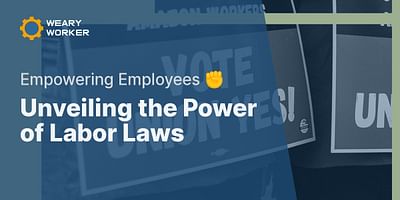Arthur Medhurst is a seasoned professional in the field of workers' compensation settlements, specializing in simplifying intricate legal concepts. With more than a decade of hands-on experience, he takes pride in guiding employees through the intricate labyrinth of legal procedures. Arthur is a born-and-bred New Yorker and an enthusiastic supporter of the Yankees.
Understanding the importance of welfare in labor law begins with recognizing the fundamental objective of these laws: to protect the rights and well-being of workers. Welfare, in this context, refers to the provision of benefits and protections that contribute to the health, safety, and general well-being of employees.
Let's Unpack the Role of Welfare in Labor Law 📚
Welfare provisions in labor law serve to ensure that the workplace is not just a venue for economic activity, but also a space where workers' rights to decent working conditions, fair treatment, and security are upheld. These laws are designed to prevent exploitation and abuse, and to promote fairness and justice in employment relationships.
For example, labor laws mandate employers to provide safe working conditions, reasonable hours, and fair wages. They also stipulate that employers must respect workers' rights to form and join unions, to engage in collective bargaining, and to participate in industrial action where necessary. All these aspects contribute to the welfare of workers.
So, Why Should We Care About Welfare in Labor Law? 🤔
The importance of welfare in labor law is multifaceted. Firstly, it promotes dignity and respect in the workplace. By ensuring that workers are treated fairly and decently, labor laws help to foster a culture of respect and dignity. This, in turn, contributes to a more productive and harmonious working environment.
Secondly, welfare provisions in labor laws protect workers from exploitation and abuse. They set minimum standards for wages and working conditions, and provide mechanisms for addressing grievances and disputes. Without these protections, workers would be vulnerable to unfair treatment and exploitation.
Thirdly, welfare in labor law contributes to social stability. By ensuring that workers receive a fair share of the wealth they help to create, labor laws help to reduce income inequality and promote social cohesion. This is crucial for the stability and well-being of society as a whole.
Unveiling the Real-World Impact of Welfare Provisions 💼
Welfare provisions in labor laws have a significant impact on workers' lives. They ensure that workers receive fair remuneration for their labor, enjoy safe and healthy working conditions, and have access to mechanisms for resolving disputes and grievances. They also provide a safety net for workers in times of illness, injury, or unemployment.
For a deeper understanding of the specifics of these laws, you might want to check out this comprehensive overview of Georgia labor laws or explore the ways to ensure compliance with labor laws and standards.















